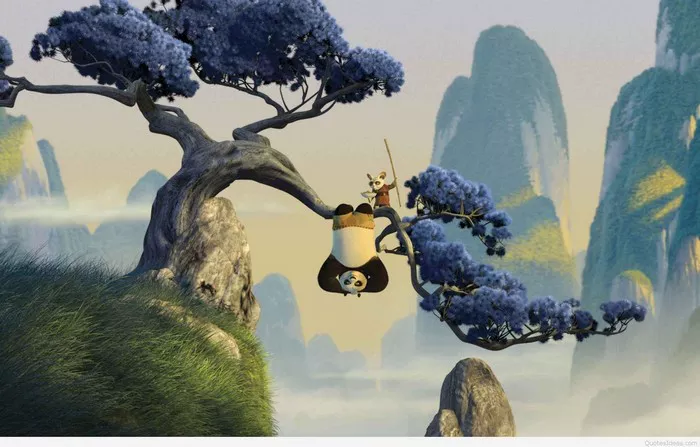Kung Fu Panda, an animated martial arts comedy film produced by DreamWorks Animation, captivated audiences worldwide with its blend of action, humor, and heartwarming storytelling. Released in 2008, the film introduced viewers to the lovable protagonist Po, a bumbling panda who dreams of becoming a kung fu master. In this article, we will delve into the origins of Kung Fu Panda, exploring its development, release, and enduring legacy as a beloved animated classic.
The Genesis of a Legend: Development of Kung Fu Panda
The inception of Kung Fu Panda can be traced back to the early 2000s, when DreamWorks Animation began exploring ideas for a new animated feature centered around the concept of kung fu. The studio assembled a team of talented artists, writers, and animators to bring the project to life, drawing inspiration from various sources, including classic kung fu films, Chinese mythology, and martial arts philosophy.
Creative Vision: Directors John Stevenson and Mark Osborne were tasked with bringing the world of Kung Fu Panda to the big screen, envisioning a story that would blend the excitement of martial arts action with the humor and heart of a character-driven comedy. They sought to create a film that would appeal to audiences of all ages, combining visually stunning animation with engaging storytelling and memorable characters.
Character Development: Central to the success of Kung Fu Panda is its endearing protagonist, Po, voiced by actor Jack Black. Po is a clumsy and lovable panda who dreams of becoming a kung fu master, despite his lack of training and experience. Through his journey of self-discovery and growth, Po learns valuable lessons about courage, perseverance, and the power of believing in oneself.
Cultural Influences: The filmmakers drew inspiration from Chinese culture and traditions, incorporating elements of kung fu philosophy, mythology, and aesthetics into the film’s visual style and narrative. From the majestic landscapes of ancient China to the intricate choreography of kung fu battles, Kung Fu Panda pays homage to the rich heritage of Chinese martial arts and storytelling.
The Epic Quest: Release and Reception of Kung Fu Panda
Kung Fu Panda made its theatrical debut on June 6, 2008, captivating audiences with its dazzling animation, engaging characters, and heartwarming story of self-discovery and redemption. The film received widespread acclaim from critics and audiences alike, earning praise for its stunning visuals, dynamic action sequences, and heartfelt performances.
Critical Acclaim: Kung Fu Panda garnered overwhelmingly positive reviews from critics, who praised its animation, voice acting, and thematic depth. The film’s blend of humor, action, and heart resonated with audiences of all ages, earning it a reputation as one of the standout animated films of its time.
Box Office Success: At the box office, Kung Fu Panda proved to be a commercial juggernaut, grossing over $630 million worldwide during its theatrical run. The film’s success solidified DreamWorks Animation’s reputation as a powerhouse in the animation industry and paved the way for future installments in the Kung Fu Panda franchise.
Cultural Impact: Beyond its commercial success, Kung Fu Panda left an indelible mark on popular culture, inspiring merchandise, spin-off media, and even a theme park attraction. The film’s lovable characters, memorable quotes, and iconic scenes have become enduring symbols of the beloved animated classic.
The Legacy of Kung Fu Panda: Enduring Popularity and Franchise Expansion
Over a decade since its release, Kung Fu Panda continues to captivate audiences around the world, maintaining its status as a beloved animated classic and cultural phenomenon. The film’s enduring popularity has led to the expansion of the Kung Fu Panda franchise, including sequels, television series, and spin-off media.
Sequels and Spin-Offs: Following the success of the original film, DreamWorks Animation released two sequels, Kung Fu Panda 2 in 2011 and Kung Fu Panda 3 in 2016. These films further explore the adventures of Po and his friends, delving into themes of identity, family, and destiny.
Television Series: In addition to the film sequels, Kung Fu Panda has spawned a successful television series titled Kung Fu Panda: Legends of Awesomeness. The series follows the exploits of Po and the Furious Five as they defend the Valley of Peace from various threats and villains.
Cultural Phenomenon: Kung Fu Panda has transcended its status as a mere film franchise to become a cultural phenomenon with a dedicated fanbase and widespread recognition. The film’s themes of perseverance, friendship, and self-discovery continue to resonate with audiences of all ages, making it a timeless classic in the world of animation.
Conclusion
Kung Fu Panda is more than just an animated film—it’s a timeless classic that has captured the hearts and imaginations of audiences around the world. From its humble beginnings as a concept for a martial arts comedy to its status as a cultural phenomenon and franchise juggernaut, Kung Fu Panda has left an indelible mark on popular culture and continues to inspire audiences with its message of courage, friendship, and the power of believing in oneself. As fans eagerly await future adventures in the Kung Fu Panda universe, one thing is certain: the legend of Po and the Furious Five will continue to resonate for generations to come.


